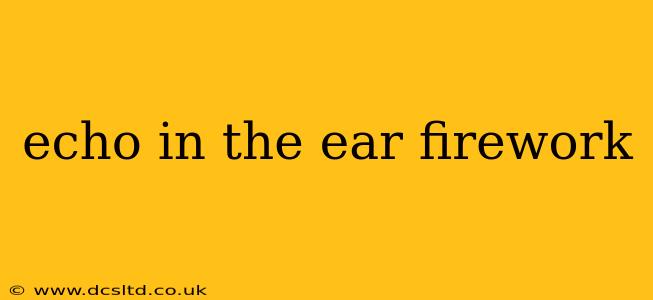The booming crackle of fireworks, the vibrant bursts of color painting the night sky – a spectacular display that many enjoy. But sometimes, that enjoyment is followed by an unsettling echo in the ear, a lingering reminder of the festivities. This phenomenon, often temporary but sometimes concerning, warrants understanding. This article explores the causes of this echo effect, addresses common concerns, and offers advice on what to do if you experience it.
What Causes an Echo in the Ear After Fireworks?
The echo, or more accurately, the ringing or buzzing sound in the ear after exposure to loud noises like fireworks, is often a sign of temporary threshold shift (TTS). This is a temporary hearing loss caused by exposure to intense sounds. The loud bangs and crackles of fireworks can overwhelm the delicate structures of the inner ear, resulting in temporary dysfunction. The "echo" is your brain's interpretation of this disruption, often perceived as a ringing, buzzing, or a delayed echo of sounds.
Is an Echo in the Ear After Fireworks Serious?
For most people, the echo in the ear after fireworks is nothing to worry about. It's usually a sign of TTS, which typically resolves itself within a few hours or days. However, if the echo persists for longer, or is accompanied by other symptoms, it's crucial to seek medical attention. This persistent ringing is known as tinnitus, and while it can be temporary, it can also be a chronic condition.
How Long Does the Echo Usually Last?
The duration of the echo varies depending on several factors, including the intensity and duration of the firework exposure, your individual hearing sensitivity, and your overall health. In most cases, the echo should subside within 24-48 hours. Anything longer necessitates a consultation with an audiologist or ENT specialist.
What Other Symptoms Should I Be Concerned About?
While a temporary echo is generally benign, be wary of accompanying symptoms such as:
- Persistent ringing (tinnitus): If the ringing continues for more than a few days, it could indicate more significant damage.
- Hearing loss: Difficulty hearing normal conversations or sounds, even after the echo subsides.
- Pain in the ear: Any sharp or persistent pain in the ear.
- Dizziness or vertigo: Feeling unsteady or lightheaded.
- Drainage from the ear: Any fluid discharge from the ear.
These symptoms warrant immediate medical attention.
What Should I Do if I Experience an Echo in My Ear After Fireworks?
If you experience a temporary echo, some simple steps can help alleviate the discomfort:
- Rest your ears: Avoid further exposure to loud noises.
- Hydration: Drink plenty of water to help your body recover.
- Over-the-counter pain relievers: Pain relievers like ibuprofen can help with any associated discomfort.
- Avoid straining: Refrain from activities that might further strain your ears.
Protecting Your Hearing During Fireworks Displays
Preventing hearing damage is always preferable to treatment. Here's how to protect your hearing during firework displays:
- Distance yourself: The farther away you are from the source of the noise, the less intense the sound will be.
- Ear protection: Consider wearing earplugs or earmuffs, especially if you are in a close proximity to the fireworks.
- Take breaks: If the display is lengthy, consider taking breaks to allow your ears to rest.
Remember, prioritizing hearing health is crucial. While the occasional temporary echo after fireworks might be commonplace, persistent symptoms necessitate professional medical evaluation. By understanding the causes and taking preventative measures, you can enjoy the dazzling spectacle of fireworks while safeguarding your hearing.
